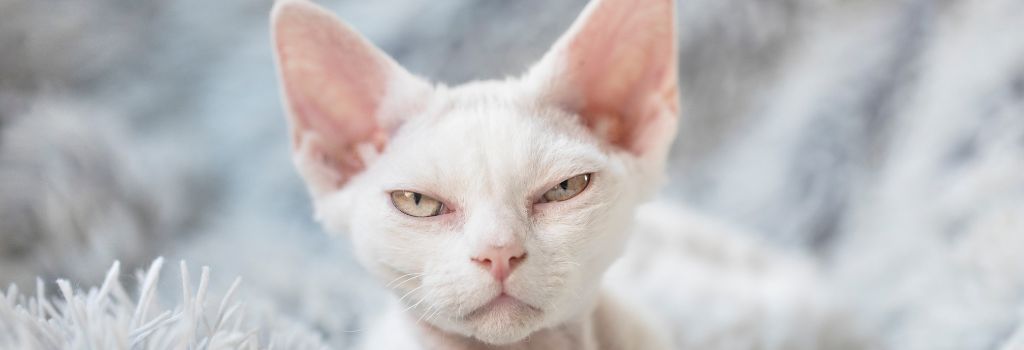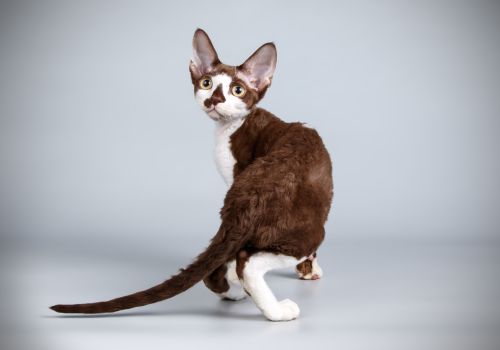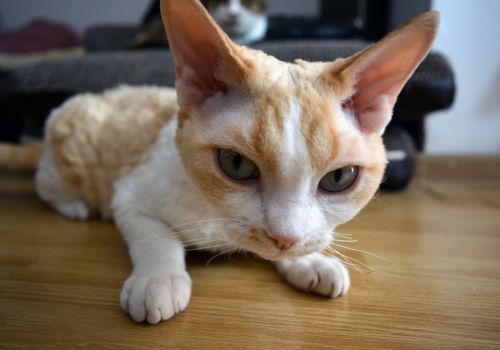Diving into the wonderful world of Devon Rexes, also affectionately known as "Pixie Cats." If you're lucky enough to share your life with one of these unique creatures, you already know you've got a forever kitten by your side!
A Purr-fect Match for Many
Devon Rexes are like the Peter Pans of the cat kingdom—they stay playful throughout their lives! They're amazing with kids and are as sociable with other pets as they are with humans. Plus, they adore scaling high places—so don't be surprised if you find them perched on the highest bookshelf. And here's a bonus: their short, wavy coats need very little grooming. Yes, you heard that right—more time for snuggles!
"Too Smart for Their Own Good" Could Be Their Middle Name
Now, let's talk about their brains. These cats are not just another pretty face; they're incredibly smart. This means they can learn tricks and might just outwit you every once in a while. They live to please and are usually eager to show off their acrobatic skills or newly-learned tricks.
A Few Quirks to Keep in Mind
But remember, perfection is overrated! Your Devon may hate the cold as much as you hate Mondays. They're prone to feeling chilly, so keep that in mind when you're cranking up the AC. And if you're the sort of person who loves a quiet moment alone, well, good luck with that! These kitties want to be involved in EVERYTHING you're doing. Also, those adorable ears? They need frequent cleaning, so make it part of your regular bonding ritual.
Can't Handle the Separation
Are you the type who gets separation anxiety from your pets? Well, the feeling is mutual! Devons aren't fans of solitude and can get a little stressed when left alone for long periods. So if you're heading out for the day, maybe leave some fun toys or a treat puzzle to keep them entertained.
The Pixie Cat Legacy
So where did these lovable, elf-like cats originate? The first Devon Rex was discovered in Devonshire, England, back in the late 1950s. Their unique, curly coats set them apart from other Rex breeds like the Cornish and Selkirk Rex. With their low-set ears, oversized eyes, and a short nose, they totally live up to their "Pixie Cat" nickname.

The Social Butterfly of the Feline World
Their affectionate and social nature makes them more dog-like in some ways, always craving attention and interaction. They even love playing fetch! Just don't leave them alone too long, or you'll have a sulking pixie on your hands.
So is sharing your life with a Devon Rex worth it? If you adore a cat with personality galore, who's brimming with intelligence and playful antics, then the answer is a resounding yes! Your Devon Rex is a unique gem, and life with them will be anything but boring.
Genetic Predispositions for Devon Rexes
When Hearts Throw Clots: Arterial Thromboembolism
First on the list is feline aortic thromboembolism, or FATE for short. Basically, it's a frightening situation where blood clots get stuck in a cat's arteries, most often blocking the blood flow to their hind legs. Imagine one or both hind legs suddenly going limp, cold, or painful—that's a red alert for FATE. This is not just a ‘wait and see’ scenario; it's a dash to the emergency vet moment. If your Pixie Cat has heart disease, your vet might prescribe meds to lessen the risk of clots. Oh, and the good news? Cats that survive this condition generally get their leg function back!
When Blood Doesn't Stick: Vitamin K-Dependent Coagulopathy
Moving on, we have a condition that impacts your kitty’s ability to clot blood properly. It’s called Vitamin K-dependent coagulopathy. It's kind of a rare genetic disorder, and Devon Rexes are more prone to it. How do you spot it? Bruising, lethargy, pale gums, and even blood in the urine are clues. And if minor trauma causes major bleeding, it's vet time—stat. The good news? Once diagnosed, it's usually easy to manage with Vitamin K supplements. Just keep this condition in mind if you're thinking of breeding your Devon Rex.

Know Your Cat's Blood Type—Just in Case!
When disaster strikes, knowing your cat's blood type can be a lifesaver. While most domestic cats are type A, our beloved Devons often have type B or sometimes AB blood. Why does it matter? In case of a blood transfusion, matching blood types is a must. So, get your cat's blood type checked, especially if you have a purebred. It's quick and can even be added to your pet’s microchip records!
The Perils of First Milk: Neonatal Isoerythrolysis (NI)
Next up, a situation that's sad but crucial to know about is neonatal Isoerythrolysis. This affects newborn kittens that drink their first milk (colostrum) from a mom with a different blood type. It triggers an immune reaction that can be fatal. If you're considering breeding, consult your vet to understand how to mitigate this risk, especially since Devon Rexes are at a higher risk.
The Kneecap Conundrum: Patellar Luxation
You know those crazy jumps and pounces your Pixie Cat loves? Well, sometimes those are jeopardized by a condition called patellar luxation. It means their kneecap can slip out of place, which can gradually lead to lameness as your cat grows older. The best way to detect it early is through an x-ray, which can often be done when your kitten is spayed or neutered. Treatment varies from arthritis meds to surgery, depending on severity.
Not Just a Dog Thing: Hip Dysplasia
Let's chat about hip dysplasia. Though more commonly talked about in dogs, our Devon Rex pals can also suffer from this genetic condition. It leads to hip joint issues and arthritis, often causing cats to slow down much earlier in life than they should. X-rays can diagnose this issue early on, and you might even want to schedule it during your cat’s annual dental cleaning to minimize anesthetic events. Treatment might involve surgical interventions to make your kitty more comfortable.
Amyloidosis: When Proteins Go Rogue
Ever heard of amyloids? They're a kind of protein, but these little guys can be up to no good when they decide to settle in the wrong places. In humans, amyloids are often linked to Alzheimer's disease. But in our feline friends, they typically gather in the belly—more specifically, in organs like the kidneys, liver, and pancreas. Imagine your organs trying to do their job while wading through a pool of these protein clumps. Yep, not fun! It can actually lead to organ failure. Diagnosis is a bit complex; blood and urine tests can give us clues, but a tissue biopsy is a surefire way to confirm amyloidosis. Sadly, there's no cure for the disease itself yet, but medications and dietary changes can support the affected organs.
Hypotrichosis: The Case of the Mysterious Hair Loss
If you've noticed your Devon Rex kitty looking a bit sparse in the fur department, it might be hypotrichosis. Think of it as male pattern baldness, but for cats! It's a genetic condition that leads to thinning hair or bald spots. It's particularly noticeable on the torso and head and may show up right after birth. While this condition isn't painful, you'll want to be extra careful with your cat's delicate skin. As of now, there's no magic remedy to make the fur grow back, and because it's in the genes, it's best not to breed cats with this condition.

Urticaria Pigmentosa: The Itchy Puzzle
Your Devon Rex is scratching like it's got a case of the "itchies," but what's the deal? It could be urticaria pigmentosa, a somewhat mysterious skin disease. From allergies to parasites, there are many common culprits for skin irritations, but urticaria pigmentosa is specific and potentially genetic. To get to the bottom of it, diagnostic tests are your best bet. No need to play the guessing game when we can identify the root cause and tailor the treatment accordingly.
Deafness: When Silence Isn't Golden
Notice your white, blue-eyed kitty isn't responding when you call? It's not just being snobbish; it might be dealing with congenital deafness. Deafness can also be genetic, especially in some Pixie Cat lines. If your feline friend isn't reacting to sounds, it's time for a vet visit to rule out treatable issues like ear polyps or infections. While there's no cure for genetic deafness, deaf cats can lead fulfilling lives indoors, where it's safe and cozy.
Dystocia: The Risky Business of Cat Birthing
Planning to breed your Devon Rex? Take a moment to consider dystocia—a fancy word for 'difficult birth.' This isn't a beginner's game; breeding Devon Rex cats can be both costly and risky. In some breeds, C-sections are almost always needed, putting both the mama cat and her kittens at a higher risk. So if you're planning to enter the realm of Devon Rex breeding, make sure you're prepared to invest time, effort, and resources to mitigate these risks.
If you have questions and you'd like to reach out to us, you can call us directly at (518) 620-5154, or you can email us at [email protected]. Don't forget to follow us on social media Facebook, Instagram.
